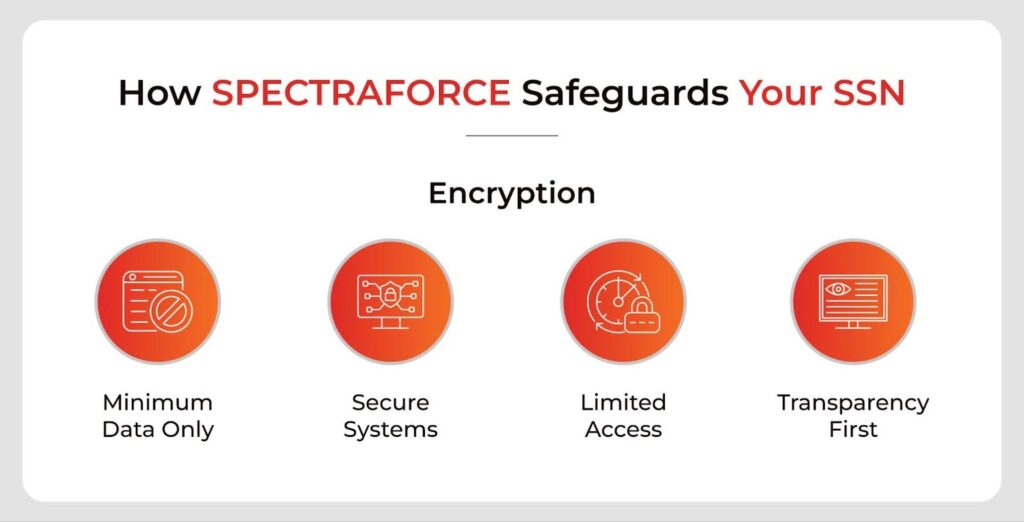You’re halfway through a job application. The recruiter seems genuine, the role looks promising, and then they ask for your Social Security number.
You start thinking, “Why do they need this now? Isn’t SSN something I should only share after an offer letter?”
You’re not alone.
Many candidates feel the same way. Part of the hesitation comes from timing as asking for an SSN before an offer letter feels premature.
But there’s also a bigger concern: data security. A 2021 Justice Department study found that nearly 1 in 10 Americans had been victims of identity theft in just that year. With numbers like these, it’s natural for candidates to want reassurance that their information will be handled safely.
So let’s clear the air.
Employers and hiring partners like SPECTRAFORCE sometimes must request your SSN. Sometimes they ask later in the process, sometimes earlier. This article will explain why, when, how, and most importantly, how your sensitive information is kept safe during hiring processes.
Why Some Employers Ask for Partial SSN Earlier
Here’s where most candidates get confused. You’re still interviewing, maybe not even through round one, and a recruiter asks for the last 4 digits of your SSN and your birth month/year.
Why so soon? The answer isn’t about the recruiter, it’s about the client’s system.
The Role of Vendor Management Systems (VMS)
Large companies manage contingent hiring through Vendor Management Systems. These platforms require each candidate to have a unique ID. The simplest way to create that ID? Combine the last 4 digits of your SSN with your birth month and year.
Why?
- It prevents duplicate submissions from different agencies.
- It ensures candidates with common names aren’t mixed up.
- It creates a compliance trail that can be audited, and also allows the client to perform rehire verification at the time of submittal.
And here’s the part candidates rarely get to know: this is a client-driven requirement, not a staffing firm’s preference. If a client uses VMS, every partner must adhere to this rule.
What SPECTRAFORCE Collects (and Doesn’t)
- Only the last 4 digits of your SSN.
- Only your birth month and year.
- Never your full SSN.
- Never your birth date.
This data is entered only into the client’s secure VMS portal. It isn’t stored internally at SPECTRAFORCE. It isn’t visible to hiring managers. It isn’t shared beyond the submission.
What Is a Social Security Number and Why Is It Sensitive?
Think of your Social Security number as your financial fingerprint. It was created to track your wages and benefits. But over time, it has become a universal identifier across banks, tax agencies, and even employers.
That uniqueness is a double-edged sword:
- On one side, it ensures accuracy in payroll, taxes, and benefits.
- On the other hand, it makes your SSN one of the most prized targets for identity thieves.
But here’s the key: employers don’t ask for SSNs out of habit. They ask because certain parts of the hiring process require it.
Why Employers Need Your SSN (and When)
You might wonder: “Do they really need my SSN, or is this just red tape?” The answer depends on which stage of hiring you’re in. Let’s break down the four legitimate moments when your SSN really is required and why they happen at different stages.
Payroll and Tax Reporting
Once you’re hired, your employer must set you up for payroll. The IRS requires your SSN for W-2 reporting. Without it, they can’t deduct taxes or report wages. This is non-negotiable, and it only happens after you’re officially on board.
I-9 Employment Verification (and E-Verify)
Every new hire fills out Form I-9 to confirm work eligibility. Here’s the nuance: your SSN is optional on the I-9 unless the employer uses E-Verify. In that case, your SSN becomes mandatory because the government system electronically verifies your details. Importantly, this step happens after hire, not during early job applications.
Background Check
This is the most common stage. Before you start, most companies run a background check. An SSN background check usually begins with an SSN trace. That trace links your number to past addresses and possible aliases, ensuring the check covers the right person.
The Fair Credit Reporting Act requires your written consent before any background check. So, if you’re asked for your SSN at this stage, it should always be accompanied by a disclosure form.
State New-Hire Reporting
Every state requires employers to report new hires within 20 days. This includes your SSN so that child support orders can be enforced and unemployment fraud reduced. Again, this happens after you’ve been hired.
How SPECTRAFORCE Safeguards Your SSN
Candidates often ask: “Okay, I get why you need part of my SSN. But how do I know it won’t be misused?” That’s a fair question.
Trust has to be earned, especially when it comes to sensitive information.

Here’s how SPECTRAFORCE protects your data every step of the way:
Encryption
We never ask for SSNs over text or open email. All recruiter emails are encrypted, meaning your details are scrambled in transit and can’t be read if intercepted. This matters because the FTC reports that unencrypted communication is one of the most common entry points for identity thieves. If you’d rather not email at all, we give you the option to share by phone.
Minimum Data Only
We follow the Social Security Administration’s guidance to limit SSN use. That’s why we never request your full SSN at the application stage. Instead, we only collect the last four digits, plus month and year of birth, when a client system requires it. This approach ensures compliance while keeping your personal data exposure low.
Secure Systems
The partial SSN you provide is entered only into secure Vendor Management System (VMS) portals used by our clients. It is never stored in spreadsheets or local files, and it’s never visible to hiring managers. These systems are designed with audit trails and compliance safeguards because our Fortune 500 clients demand enterprise-grade security.
Limited Access
Only recruiters who are actively submitting your profile to a client can access the partial SSN. Even inside SPECTRAFORCE, access is restricted, and all data is encrypted to ensure it remains protected.
Transparency First
Most importantly, we explain why we ask before you decide. If something doesn’t feel clear, we’ll tell you precisely what information is required, how it will be used, and how it will be protected. You always have the right to ask questions before you share.
When Your SSN Is Required vs. Optional
To keep things simple, let’s separate the two.
| Required | Optional |
| Payroll and W-2 reporting (for taxes and IRS compliance) | Full SSN requested during initial recruiter contact |
| I-9 employment verification if the employer uses E-Verify | Requests sent over unencrypted email, text, or messaging apps |
| Background check with your signed consent | Demands for banking information along with SSN before an offer |
| State new-hire reporting (required by state agencies after hire) | Any request without a clear explanation of why it’s needed |
| VMS submissions (partial SSN only, last 4 digits + month/year of DOB) | Pressure to provide full SSN without secure systems in place |
Remember: if you feel pressured, that’s a red flag.
How You Can Protect Your SSN
Even when you trust the recruiter, it’s smart to take precautions.
Verify Who’s Asking
Always confirm the recruiter is legitimate before sharing sensitive information.
- Look for a company email address (not Gmail/Yahoo).
- Confirm the job details with the recruiter by asking for the job description, rate, hiring company, and any other relevant specifics.
- Search LinkedIn to see if the recruiter actually works at the company.
If something feels off, like an email that doesn’t match the domain, pause. Many SSN scams start with look-alike accounts.
Ask the Right Questions
Before sharing even the last 4 digits of your SSN, ask:
- Why do you need my SSN at this stage?
- How will it be used in your hiring process?
- How will you protect it once I share it?
A legitimate recruiter will answer clearly. If they can’t or pressure you instead, that’s a red flag.
Share Securely
Never send your full Social Security number over unencrypted text or email. The FTC warns that this is one of the top ways identity thieves strike. Safe options include:
- Encrypted company email.
- A secure applicant portal.
- Alternatively, you can share by phone if you’re more comfortable.
Provide the Minimum
Give only what’s needed.
- For VMS submissions, last 4 digits plus birth month/year.
- For onboarding, a full SSN is required when legally required (W-2, I-9 with E-Verify, or a background check with consent).
This principle of “minimum disclosure” reduces your exposure while maintaining compliance in the hiring process.
If You Don’t Have an SSN Yet
International candidates often apply before having one. That’s fine, you can still interview and receive an offer. Onboarding may wait until your SSN arrives. The SSA explains step-by-step how to get a Social Security number if you’re new to the U.S.
Stay Alert After You Share
Protecting your SSN doesn’t stop once you provide it.
- Monitor your credit regularly.
- If you suspect misuse, place a fraud alert or freeze your credit.
Final Thoughts
Most organizations stop at compliance. At SPECTRAFORCE, we go further by combining compliance with secure technology and a people-first mindset. We limit data collection, protect it with enterprise-grade security systems, and maintain transparency from day one.
That’s why global enterprises trust us with their hiring, and candidates trust us with their futures. Your Social Security number is safeguarded here not just because it has to be, but because protecting people is at the heart of people-first hiring.
FAQs
Usually, no. Most job applications don’t need your full Social Security number until onboarding or a background check. The only exception is when a client’s VMS system requires the last 4 digits for identity matching. Always confirm why it’s needed before sharing.
Some clients use Vendor Management Systems that require a partial SSN to create a candidate ID and avoid duplicate submissions. Others only collect it later for payroll or SSN background check. The difference depends on the client’s hiring process, not the recruiter’s choice.
Your partial Social Security number is only entered into secure client systems, not stored in internal files. Recruiter emails are encrypted, access is limited, and hiring managers never see them. These safeguards reduce data privacy concerns while keeping the process compliant.
You can still interview and move through the hiring process without one. Onboarding may pause until you receive it. The SSA explains how to get a Social Security number, and once issued, it will be used for payroll, I-9, and reporting.
A partial SSN is used to create a candidate ID in client VMS platforms. A full SSN, when collected later, is used for payroll, W-2 reporting, I-9 (if E-Verify), or a background check. It isn’t stored in local files or shared outside authorized systems.



